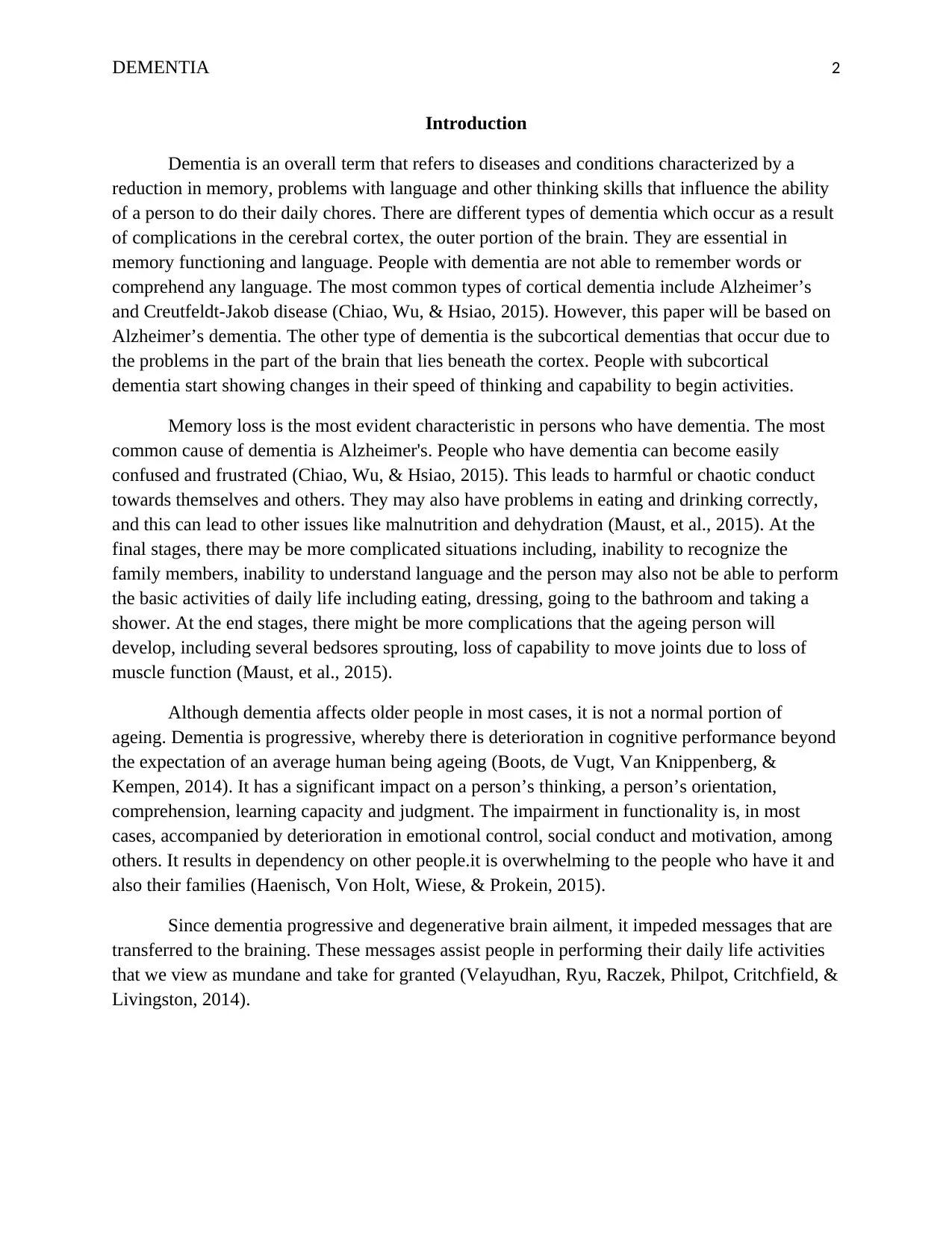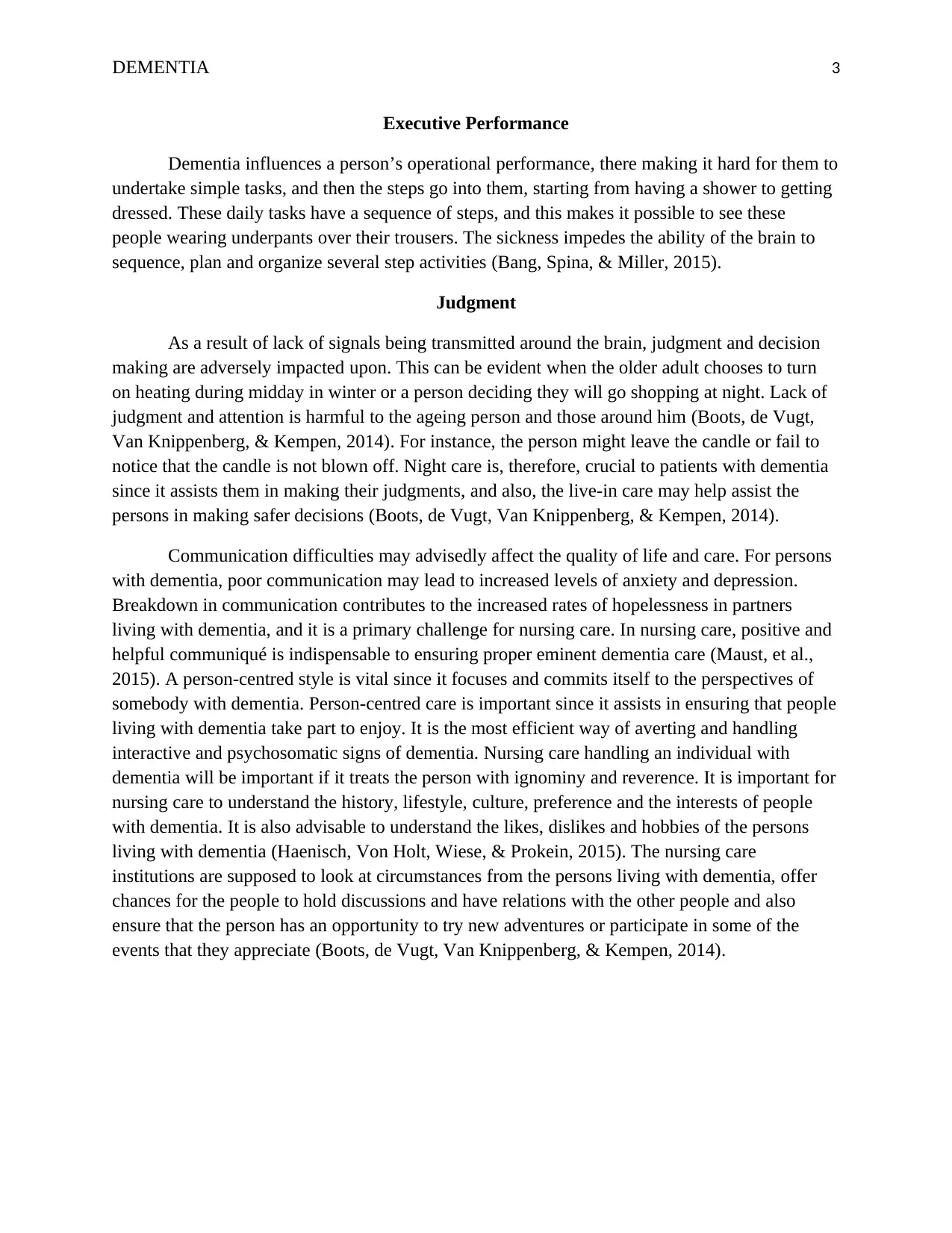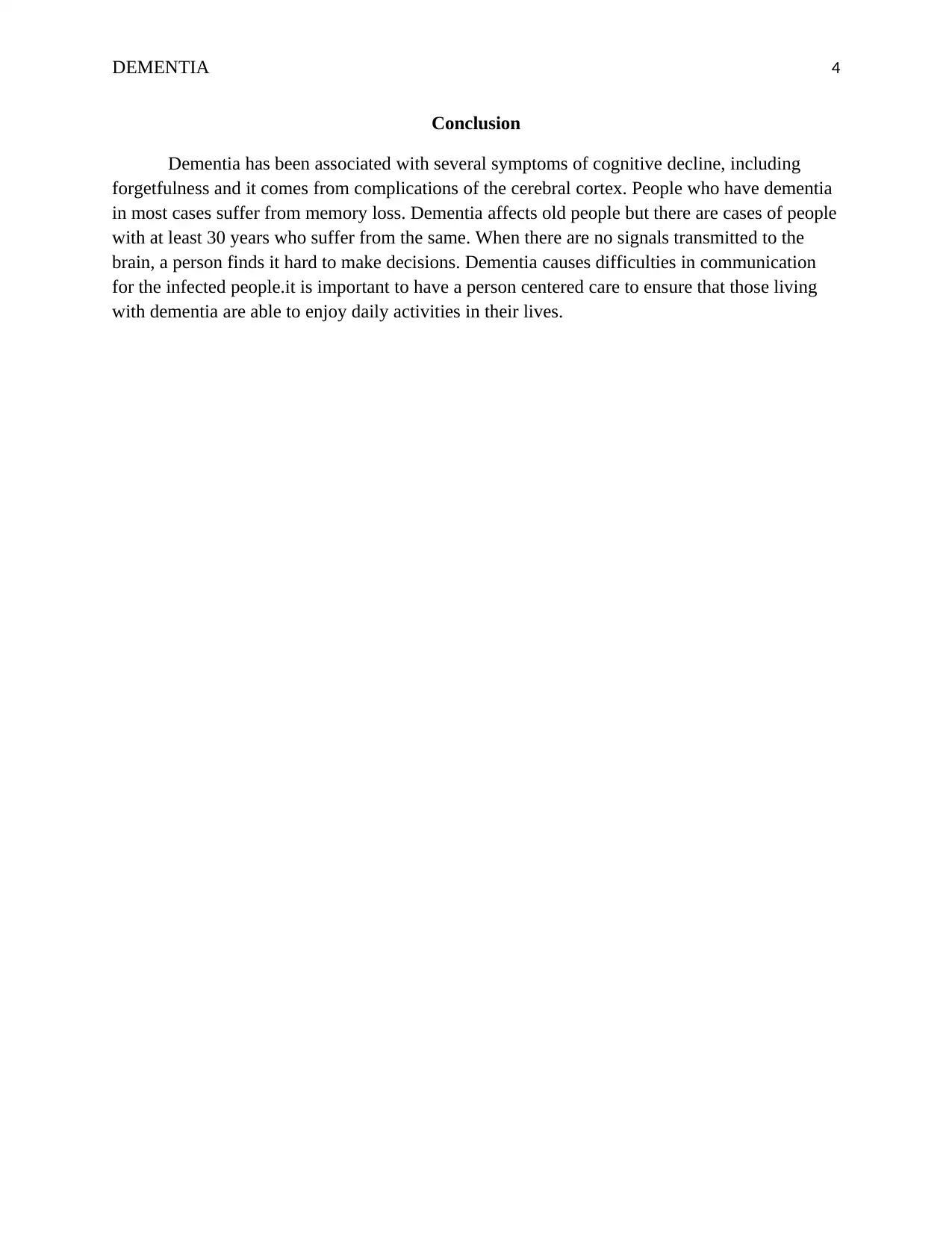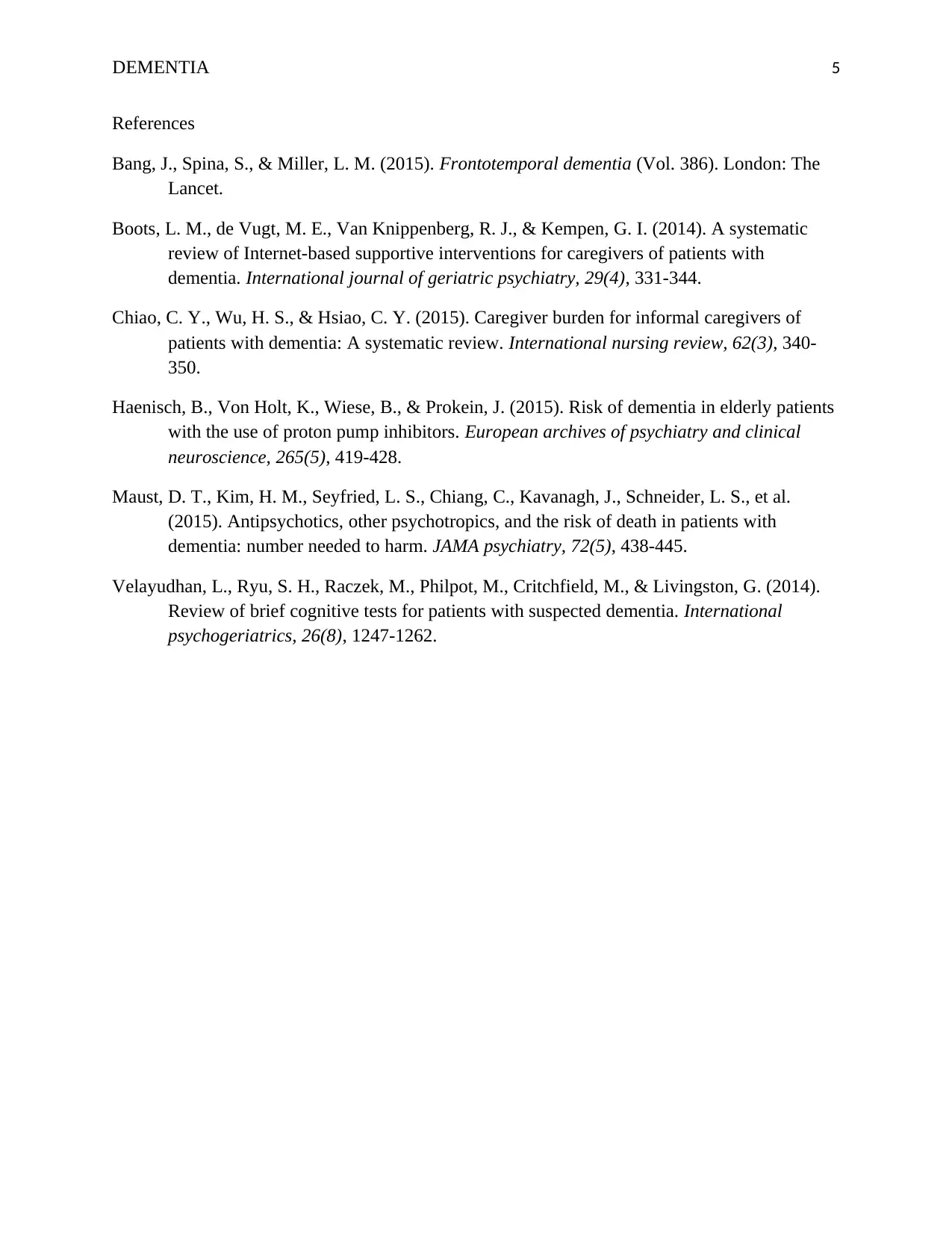Alzheimers dementia Disease Analysis
VerifiedAdded on 2022/08/22
|5
|1485
|27
AI Summary
Contribute Materials
Your contribution can guide someone’s learning journey. Share your
documents today.

Running Head: DEMENTIA
DEMENTIA
Name
Professor
Institution
Course
DEMENTIA
Name
Professor
Institution
Course
Secure Best Marks with AI Grader
Need help grading? Try our AI Grader for instant feedback on your assignments.

DEMENTIA 2
Introduction
Dementia is an overall term that refers to diseases and conditions characterized by a
reduction in memory, problems with language and other thinking skills that influence the ability
of a person to do their daily chores. There are different types of dementia which occur as a result
of complications in the cerebral cortex, the outer portion of the brain. They are essential in
memory functioning and language. People with dementia are not able to remember words or
comprehend any language. The most common types of cortical dementia include Alzheimer’s
and Creutfeldt-Jakob disease (Chiao, Wu, & Hsiao, 2015). However, this paper will be based on
Alzheimer’s dementia. The other type of dementia is the subcortical dementias that occur due to
the problems in the part of the brain that lies beneath the cortex. People with subcortical
dementia start showing changes in their speed of thinking and capability to begin activities.
Memory loss is the most evident characteristic in persons who have dementia. The most
common cause of dementia is Alzheimer's. People who have dementia can become easily
confused and frustrated (Chiao, Wu, & Hsiao, 2015). This leads to harmful or chaotic conduct
towards themselves and others. They may also have problems in eating and drinking correctly,
and this can lead to other issues like malnutrition and dehydration (Maust, et al., 2015). At the
final stages, there may be more complicated situations including, inability to recognize the
family members, inability to understand language and the person may also not be able to perform
the basic activities of daily life including eating, dressing, going to the bathroom and taking a
shower. At the end stages, there might be more complications that the ageing person will
develop, including several bedsores sprouting, loss of capability to move joints due to loss of
muscle function (Maust, et al., 2015).
Although dementia affects older people in most cases, it is not a normal portion of
ageing. Dementia is progressive, whereby there is deterioration in cognitive performance beyond
the expectation of an average human being ageing (Boots, de Vugt, Van Knippenberg, &
Kempen, 2014). It has a significant impact on a person’s thinking, a person’s orientation,
comprehension, learning capacity and judgment. The impairment in functionality is, in most
cases, accompanied by deterioration in emotional control, social conduct and motivation, among
others. It results in dependency on other people.it is overwhelming to the people who have it and
also their families (Haenisch, Von Holt, Wiese, & Prokein, 2015).
Since dementia progressive and degenerative brain ailment, it impeded messages that are
transferred to the braining. These messages assist people in performing their daily life activities
that we view as mundane and take for granted (Velayudhan, Ryu, Raczek, Philpot, Critchfield, &
Livingston, 2014).
Introduction
Dementia is an overall term that refers to diseases and conditions characterized by a
reduction in memory, problems with language and other thinking skills that influence the ability
of a person to do their daily chores. There are different types of dementia which occur as a result
of complications in the cerebral cortex, the outer portion of the brain. They are essential in
memory functioning and language. People with dementia are not able to remember words or
comprehend any language. The most common types of cortical dementia include Alzheimer’s
and Creutfeldt-Jakob disease (Chiao, Wu, & Hsiao, 2015). However, this paper will be based on
Alzheimer’s dementia. The other type of dementia is the subcortical dementias that occur due to
the problems in the part of the brain that lies beneath the cortex. People with subcortical
dementia start showing changes in their speed of thinking and capability to begin activities.
Memory loss is the most evident characteristic in persons who have dementia. The most
common cause of dementia is Alzheimer's. People who have dementia can become easily
confused and frustrated (Chiao, Wu, & Hsiao, 2015). This leads to harmful or chaotic conduct
towards themselves and others. They may also have problems in eating and drinking correctly,
and this can lead to other issues like malnutrition and dehydration (Maust, et al., 2015). At the
final stages, there may be more complicated situations including, inability to recognize the
family members, inability to understand language and the person may also not be able to perform
the basic activities of daily life including eating, dressing, going to the bathroom and taking a
shower. At the end stages, there might be more complications that the ageing person will
develop, including several bedsores sprouting, loss of capability to move joints due to loss of
muscle function (Maust, et al., 2015).
Although dementia affects older people in most cases, it is not a normal portion of
ageing. Dementia is progressive, whereby there is deterioration in cognitive performance beyond
the expectation of an average human being ageing (Boots, de Vugt, Van Knippenberg, &
Kempen, 2014). It has a significant impact on a person’s thinking, a person’s orientation,
comprehension, learning capacity and judgment. The impairment in functionality is, in most
cases, accompanied by deterioration in emotional control, social conduct and motivation, among
others. It results in dependency on other people.it is overwhelming to the people who have it and
also their families (Haenisch, Von Holt, Wiese, & Prokein, 2015).
Since dementia progressive and degenerative brain ailment, it impeded messages that are
transferred to the braining. These messages assist people in performing their daily life activities
that we view as mundane and take for granted (Velayudhan, Ryu, Raczek, Philpot, Critchfield, &
Livingston, 2014).

DEMENTIA 3
Executive Performance
Dementia influences a person’s operational performance, there making it hard for them to
undertake simple tasks, and then the steps go into them, starting from having a shower to getting
dressed. These daily tasks have a sequence of steps, and this makes it possible to see these
people wearing underpants over their trousers. The sickness impedes the ability of the brain to
sequence, plan and organize several step activities (Bang, Spina, & Miller, 2015).
Judgment
As a result of lack of signals being transmitted around the brain, judgment and decision
making are adversely impacted upon. This can be evident when the older adult chooses to turn
on heating during midday in winter or a person deciding they will go shopping at night. Lack of
judgment and attention is harmful to the ageing person and those around him (Boots, de Vugt,
Van Knippenberg, & Kempen, 2014). For instance, the person might leave the candle or fail to
notice that the candle is not blown off. Night care is, therefore, crucial to patients with dementia
since it assists them in making their judgments, and also, the live-in care may help assist the
persons in making safer decisions (Boots, de Vugt, Van Knippenberg, & Kempen, 2014).
Communication difficulties may advisedly affect the quality of life and care. For persons
with dementia, poor communication may lead to increased levels of anxiety and depression.
Breakdown in communication contributes to the increased rates of hopelessness in partners
living with dementia, and it is a primary challenge for nursing care. In nursing care, positive and
helpful communiqué is indispensable to ensuring proper eminent dementia care (Maust, et al.,
2015). A person-centred style is vital since it focuses and commits itself to the perspectives of
somebody with dementia. Person-centred care is important since it assists in ensuring that people
living with dementia take part to enjoy. It is the most efficient way of averting and handling
interactive and psychosomatic signs of dementia. Nursing care handling an individual with
dementia will be important if it treats the person with ignominy and reverence. It is important for
nursing care to understand the history, lifestyle, culture, preference and the interests of people
with dementia. It is also advisable to understand the likes, dislikes and hobbies of the persons
living with dementia (Haenisch, Von Holt, Wiese, & Prokein, 2015). The nursing care
institutions are supposed to look at circumstances from the persons living with dementia, offer
chances for the people to hold discussions and have relations with the other people and also
ensure that the person has an opportunity to try new adventures or participate in some of the
events that they appreciate (Boots, de Vugt, Van Knippenberg, & Kempen, 2014).
Executive Performance
Dementia influences a person’s operational performance, there making it hard for them to
undertake simple tasks, and then the steps go into them, starting from having a shower to getting
dressed. These daily tasks have a sequence of steps, and this makes it possible to see these
people wearing underpants over their trousers. The sickness impedes the ability of the brain to
sequence, plan and organize several step activities (Bang, Spina, & Miller, 2015).
Judgment
As a result of lack of signals being transmitted around the brain, judgment and decision
making are adversely impacted upon. This can be evident when the older adult chooses to turn
on heating during midday in winter or a person deciding they will go shopping at night. Lack of
judgment and attention is harmful to the ageing person and those around him (Boots, de Vugt,
Van Knippenberg, & Kempen, 2014). For instance, the person might leave the candle or fail to
notice that the candle is not blown off. Night care is, therefore, crucial to patients with dementia
since it assists them in making their judgments, and also, the live-in care may help assist the
persons in making safer decisions (Boots, de Vugt, Van Knippenberg, & Kempen, 2014).
Communication difficulties may advisedly affect the quality of life and care. For persons
with dementia, poor communication may lead to increased levels of anxiety and depression.
Breakdown in communication contributes to the increased rates of hopelessness in partners
living with dementia, and it is a primary challenge for nursing care. In nursing care, positive and
helpful communiqué is indispensable to ensuring proper eminent dementia care (Maust, et al.,
2015). A person-centred style is vital since it focuses and commits itself to the perspectives of
somebody with dementia. Person-centred care is important since it assists in ensuring that people
living with dementia take part to enjoy. It is the most efficient way of averting and handling
interactive and psychosomatic signs of dementia. Nursing care handling an individual with
dementia will be important if it treats the person with ignominy and reverence. It is important for
nursing care to understand the history, lifestyle, culture, preference and the interests of people
with dementia. It is also advisable to understand the likes, dislikes and hobbies of the persons
living with dementia (Haenisch, Von Holt, Wiese, & Prokein, 2015). The nursing care
institutions are supposed to look at circumstances from the persons living with dementia, offer
chances for the people to hold discussions and have relations with the other people and also
ensure that the person has an opportunity to try new adventures or participate in some of the
events that they appreciate (Boots, de Vugt, Van Knippenberg, & Kempen, 2014).

DEMENTIA 4
Conclusion
Dementia has been associated with several symptoms of cognitive decline, including
forgetfulness and it comes from complications of the cerebral cortex. People who have dementia
in most cases suffer from memory loss. Dementia affects old people but there are cases of people
with at least 30 years who suffer from the same. When there are no signals transmitted to the
brain, a person finds it hard to make decisions. Dementia causes difficulties in communication
for the infected people.it is important to have a person centered care to ensure that those living
with dementia are able to enjoy daily activities in their lives.
Conclusion
Dementia has been associated with several symptoms of cognitive decline, including
forgetfulness and it comes from complications of the cerebral cortex. People who have dementia
in most cases suffer from memory loss. Dementia affects old people but there are cases of people
with at least 30 years who suffer from the same. When there are no signals transmitted to the
brain, a person finds it hard to make decisions. Dementia causes difficulties in communication
for the infected people.it is important to have a person centered care to ensure that those living
with dementia are able to enjoy daily activities in their lives.
Secure Best Marks with AI Grader
Need help grading? Try our AI Grader for instant feedback on your assignments.

DEMENTIA 5
References
Bang, J., Spina, S., & Miller, L. M. (2015). Frontotemporal dementia (Vol. 386). London: The
Lancet.
Boots, L. M., de Vugt, M. E., Van Knippenberg, R. J., & Kempen, G. I. (2014). A systematic
review of Internet‐based supportive interventions for caregivers of patients with
dementia. International journal of geriatric psychiatry, 29(4), 331-344.
Chiao, C. Y., Wu, H. S., & Hsiao, C. Y. (2015). Caregiver burden for informal caregivers of
patients with dementia: A systematic review. International nursing review, 62(3), 340-
350.
Haenisch, B., Von Holt, K., Wiese, B., & Prokein, J. (2015). Risk of dementia in elderly patients
with the use of proton pump inhibitors. European archives of psychiatry and clinical
neuroscience, 265(5), 419-428.
Maust, D. T., Kim, H. M., Seyfried, L. S., Chiang, C., Kavanagh, J., Schneider, L. S., et al.
(2015). Antipsychotics, other psychotropics, and the risk of death in patients with
dementia: number needed to harm. JAMA psychiatry, 72(5), 438-445.
Velayudhan, L., Ryu, S. H., Raczek, M., Philpot, M., Critchfield, M., & Livingston, G. (2014).
Review of brief cognitive tests for patients with suspected dementia. International
psychogeriatrics, 26(8), 1247-1262.
References
Bang, J., Spina, S., & Miller, L. M. (2015). Frontotemporal dementia (Vol. 386). London: The
Lancet.
Boots, L. M., de Vugt, M. E., Van Knippenberg, R. J., & Kempen, G. I. (2014). A systematic
review of Internet‐based supportive interventions for caregivers of patients with
dementia. International journal of geriatric psychiatry, 29(4), 331-344.
Chiao, C. Y., Wu, H. S., & Hsiao, C. Y. (2015). Caregiver burden for informal caregivers of
patients with dementia: A systematic review. International nursing review, 62(3), 340-
350.
Haenisch, B., Von Holt, K., Wiese, B., & Prokein, J. (2015). Risk of dementia in elderly patients
with the use of proton pump inhibitors. European archives of psychiatry and clinical
neuroscience, 265(5), 419-428.
Maust, D. T., Kim, H. M., Seyfried, L. S., Chiang, C., Kavanagh, J., Schneider, L. S., et al.
(2015). Antipsychotics, other psychotropics, and the risk of death in patients with
dementia: number needed to harm. JAMA psychiatry, 72(5), 438-445.
Velayudhan, L., Ryu, S. H., Raczek, M., Philpot, M., Critchfield, M., & Livingston, G. (2014).
Review of brief cognitive tests for patients with suspected dementia. International
psychogeriatrics, 26(8), 1247-1262.
1 out of 5
Related Documents
Your All-in-One AI-Powered Toolkit for Academic Success.
+13062052269
info@desklib.com
Available 24*7 on WhatsApp / Email
![[object Object]](/_next/static/media/star-bottom.7253800d.svg)
Unlock your academic potential
© 2024 | Zucol Services PVT LTD | All rights reserved.





